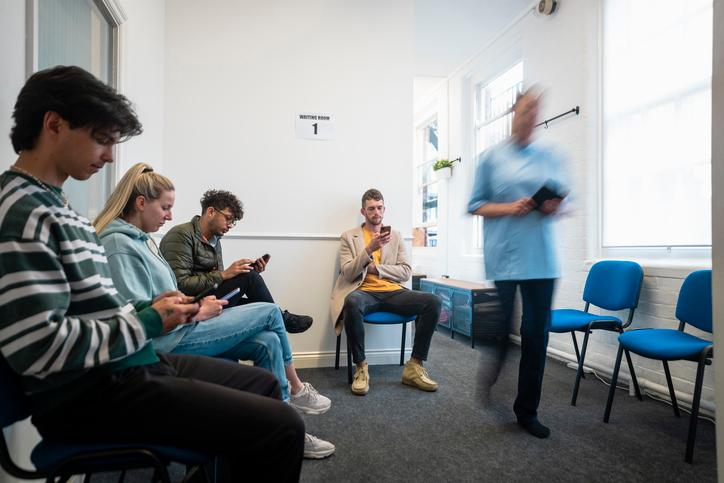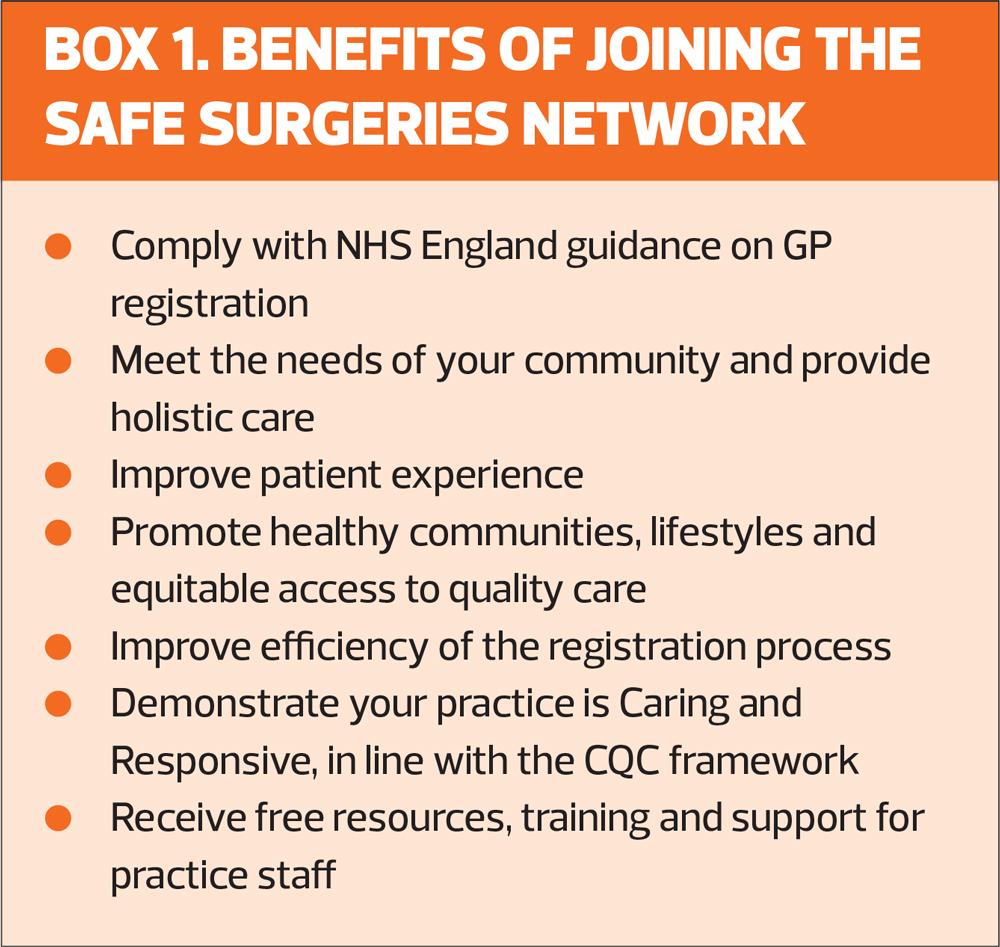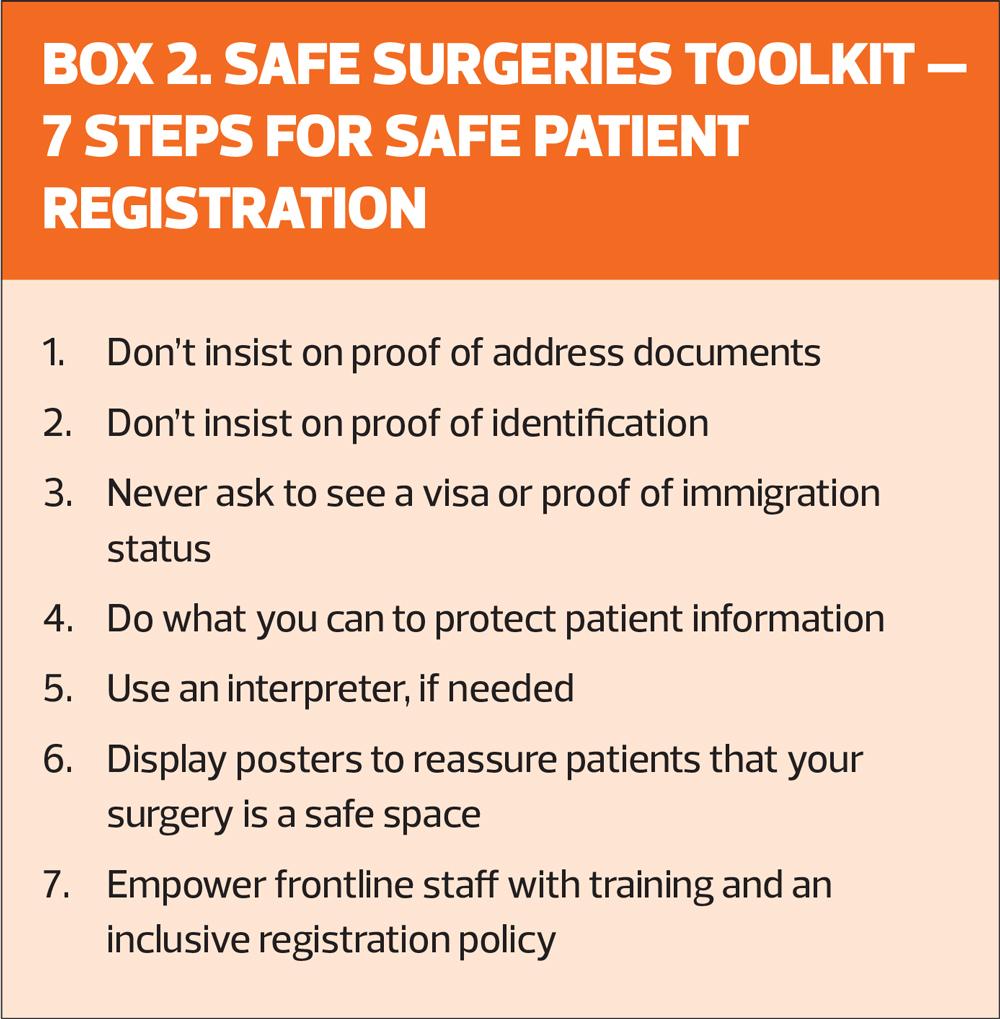
Welcoming everyone to primary care: Safe Surgeries
Marina Davidson
Marina Davidson
BSc, MPH
Primary Care Advocacy Manager,
Doctors of the World UK
Ruth Erhahon
National Health Advisor,
Doctors of the World UK
Karuna Marsh
National Health Advisor,
Doctors of the World UK
Practice Nurse 2023;53(01):5-7
Primary care is open to all, but often many underserved communities living in England are wrongly refused access to general practice services. It doesn’t need to be like this. GP practices can join the Safe Surgeries network, which provides support, resources and training to ensure everyone can register and consult with a GP when they need to
Everyone is welcome in primary care. NHS England guidance on GP registration is clear: regardless of nationality or immigration status, everyone living in England can register and consult with a GP without charge. There is no regulatory requirement to prove identity or address in order to register and an NHS number is not required.1,2
There are limited circumstances in which GP registration can be refused, including if a practice is not accepting new patients or is not open to patients outside of the catchment area, or on any other reasonable grounds. However, patients should not be refused registration if they cannot provide documentation.1,2 In theory, this means that everyone should be able to register at any local GP practice and receive the support they are entitled to. However, in reality, this is not always the case.
Some members of our communities, including people without a fixed address, people seeking asylum, and refugees, experience many barriers that delay or deter access to vital services. These barriers may include language, IT literacy, lack of understanding of the administrative process, not having a fixed address or lack of knowledge about entitlements to the NHS.6
An investigation by the Bureau of Investigative Journalism in 2021 found that almost two thirds (63%) of GP practices surveyed in 10 locations across the UK would refuse to register someone without proof of address, proof of ID or legal immigration status. Only 24% of practices were willing to register the hypothetical patient without documents.3
Evidence from the Doctors of the World clinic in East London also highlights similar issues of registration refusal for those who cannot provide proof of ID or address. Attempts by volunteers to register patients with their local GP had a refusal rate of 19%. Lack of paperwork, gatekeeping behaviour and reference to immigration status were given as reasons for refusal, all conflicting with NHS England guidance and highlighting the need for a consistent approach across practices to facilitate access for all.4
WHY IS UNIVERSAL ACCESS IMPORTANT?
Primary care is the first point of contact of the healthcare system for many new arrivals to the UK, to receive quality care and subsequent access other services including mental health support, as well as offering a key public health role.
Early access to primary care and GP registration is also vital in the efficient use of NHS services and resources. Patients who have difficulties registering with a GP may later present in A&E with conditions that have progressed or could have been prevented if diagnosed and treated earlier in primary care. Access to primary care for everyone reduces the burden on A&E and secondary care, as well as facilitating health promotion initiatives, and preventing non-communicable diseases. This is especially relevant for many underserved communities and new arrivals, including asylum seekers and refugees who may not be familiar with the health system and their entitlements.7
The context and restrictions of the NHS secondary care charging system adds further complexities for many people in vulnerable situations and exacerbates health inequalities. Many undocumented migrants are fearful of accessing health services because of data sharing with the Home Office, and although this is no longer routine in primary care, the link to secondary care raises concerns for many.3 Difficulties in registering with a GP, particularly wrongly insisting on documents, can have long-term and serious impacts, as illustrated in Karman’s story:8
‘I was so scared of going back to my previous GP because I thought that I'll be asked to pay the bill there. I was not able to register with a new GP either because I was constantly asked for a proof of address which I could not provide…If I hadn't registered, I wouldn't know I had depression and I would have gone ahead with a second attempt to commit suicide.’
Working towards universal health access also aligns with other NHS initiatives, including CORE20Plus5, which has a particular emphasis on identifying inclusion health groups locally to combat health inequalities. Inclusion health groups can include migrants in vulnerable circumstances, people who are homeless, victims of modern slavery and Gypsy, Roma and traveller communities. People in inclusion health groups are often socially excluded, experience multiple overlapping risk factors, including poverty, violence and trauma, combined with barriers to accessing services. The combination of these experiences results in widening health inequalities and poorer than average health outcomes.9,10
Although most migrants, asylum seekers and refugees will have similar health needs to the general population, their pre- and post-migration experiences may have both physical and mental health impacts, in addition to the health consequences of possible experiences of war, conflict and torture. Coupled with the barriers outlined above and the social determinants of health on arrival in the UK, including living conditions, early access to GP registration and ongoing access to the health system is essential.7,11
SAFE SURGERIES
Doctors of the World’s Safe Surgeries network is an evidence-based initiative that was launched in 2018. It aims to address some of these barriers to accessing primary care for migrants and other underserved communities by providing support for primary care staff and recognising the increasing pressures and demands on general practice.
Joining the Safe Surgeries network can provide a number of benefits to practices (Box 1). Practices that sign up will receive free resources, training and support to make their registration policies more inclusive for everyone in the community. Safe Surgeries training, delivered in online sessions or via an e-Learning course, gives an overview of the entitlements to primary care and outlines practical steps for frontline staff to offer a safe space for patients. Practices can use this to optimise registration policies, enhance efficiency of the process for patients and enable staff at all levels to approach the guidance consistently.12
One GP commented: ‘It was important for us to become a Safe Surgery because we wanted to offer a safe place for the diverse populations in our community to access healthcare services without the worry of being asked for ID or proof of address. This was particularly important to us because of the large number of vulnerable patients living in our area and the need for them to feel safe and supported when visiting our practice. It is quick and easy to register patients, which had the added effect of reducing the reception and administration workload around registrations.’
Following the Safe Surgeries principles demonstrates in CQC inspections that your practice is ‘Responsive’ to the needs of your practice population.
The Safe Surgeries principles can also help to support many inclusion health groups who may have difficulties in accessing a GP, including homeless patients who experience stark inequalities in health and reduced life expectancy and may not be able to provide proof of address documents. The Safe Surgeries social prescribing toolkit for link workers is a useful tool to support holistic care and referrals to local organisations providing non-health support, especially for people facing complex social or legal issues.14
STEPS FOR SAFE PATIENT REGISTRATION
The Safe Surgeries toolkit (Box 2) outlines seven steps for practices to follow to enhance the accessibility of their services. This includes amending practice registration policies to ensure that the inability to provide proof of ID or address are not barriers to patient registration. Although the guidance suggests practices can ask for proof of ID or address as part of the administrative process, this should not be insisted upon and registration should not be refused if patients cannot provide any form of documentation.15
The toolkit also highlights the importance of being conscious of data sharing fears and not asking about immigration status, especially during the registration process, as this is not relevant for primary care entitlement and can deter or delay many people from accessing general practice. Patients without a fixed address – or people who are concerned about sharing their address – can register with an alternative address, which can be the practice address, or a church, mosque or day centre.2,14
Practices can promote that they are a Safe Surgery in their reception area and waiting rooms, with posters available in multiple languages. Many prospective patients will also review GP practice websites before attempting to register so it is important that information and processes are up to date and reflect correct guidance and entitlements to registration. A study of London GP practice websites found that 75% suggested some form of requirement for documentation in order to register. Displaying Safe Surgeries resources in practice areas and on websites can reassure patients that they will not need documents for registration.5,16
To minimise language and communication barriers, interpretation services should be available at both reception and during the consultation, when needed. The importance of professional interpretation should be emphasised to patients, enabling important health information and advice to be communicated effectively.15
Anyone, regardless of their immigration status, can apply for a HC2 certificate for help with health costs, including prescription costs and travel to hospital appointments, through the NHS Low Income Scheme. However, many patients, particularly new migrants, may not be aware that this support is available. Practices can share this information and have HC2 forms available in the practice for additional support.6,14,17
All staff in GP practices – including reception staff, nurses and GPs – play an essential role in implementing the Safe Surgeries principles in practice. Being confident in your right to provide services, and being aware of the NHS England guidance for GP registration are key to reassuring patients of their rights to healthcare. Practices are also encouraged to engage with others in their local area or PCN, their Integrated Care Board (ICB) and share examples of good practice as part of the network.
CONCLUSION
Primary care performs a vital public health role in the prevention of disease, health promotion and minimising health inequalities but despite universal entitlements to register and consult with a GP, many marginalised groups experience barriers to accessing these vital services. GP registration is the first step towards ongoing access to quality healthcare for many, and delayed access may have long-term consequences.
The Safe Surgeries community is continually expanding across the country: currently there are 1,200 practices working together towards the common goal of inclusive and accessible GP services. Through the network, we hope to continue highlighting the good practice of healthcare professionals; recognising the barriers to access for excluded members of our communities and taking action together to secure universal provision of essential health services5.
There is still progress to be made, to increase the number of practices registering as Safe Surgeries, and to ensure all practices are embedding the principles in practice to guarantee that no one, no matter their circumstances, is turned away from a GP practice when they are in need of healthcare.
To sign up your practice as a Safe Surgery, please complete the registration form on the Doctors of the World website – https://www.doctorsoftheworld.org.uk/safesurgeries/ – and you will receive an email detailing next steps.5
REFERENCES
1. NHS England, NHS Improvement. Primary Medical Care Policy and Guidance Manual (PGM) 2022 https://www.england.nhs.uk/publication/primary-medical-care-policy-and-guidance-manual-pgm
2. NHS. How to register with a GP surgery 2019 https://www.nhs.uk/nhs-services/gps/how-to-register-with-a-gp-surgery/
3. Hamada R, Mellino E, Gayle V, et al. Most GP surgeries refuse to register undocumented migrants despite NHS policy 2021, https://www.thebureauinvestigates.com/stories/2021-07-15/most-gp-surgeries-refuse-to-register-undocumented-migrants
4. Doctors of the World. Registration refused: a study on access to GP registration in England Update 2018, https://www.doctorsoftheworld.org.uk/wp-content/uploads/2019/08/Registration-Refused-final.pdf
5. Doctors of the World. Safe Surgeries Initiative, https://www.doctorsoftheworld.org.uk/what-we-stand-for/supporting-medics/safe-surgeries-initiative
6. Kang C, Tomkow L, Farrington R. Access to primary health care for asylum seekers and refugees: a qualitative study of service user experiences in the UK. Br J Gen Prac 2019;69(685): 537-545.
7. Poduval S, Howard N, Jones L, et al. Experiences Among Undocumented Migrants Accessing Primary Care in the United Kingdom: A Qualitative Study. Int J Health Services. 2015;45(2):320-333
8. Medecins du Monde. Left behind: voices of people excluded from universal healthcare coverage in Europe 2020 https://www.doctorsoftheworld.org.uk/wp-content/uploads/2020/12/DOTW_Left_Behind.pdf
9. NHS England. Core20PLUS5 (adults) – an approach to reducing healthcare inequalities 2021 https://www.england.nhs.uk/about/equality/equality-hub/national-healthcare-inequalities-improvement-programme/core20plus5/
10. Public Health England. Inclusion Health: applying All Our Health 2021 https://www.gov.uk/government/publications/inclusion-health-applying-all-our-health/inclusion-health-applying-all-our-health
11. CQC. Registration and treatment of asylum seekers, refugees and other migrants 2022 https://www.cqc.org.uk/guidance-providers/gps/gp-mythbuster-36-registration-treatment-asylum-seekers-refugees-other
12. Doctors of the World. Safe Surgeries training 2022 https://www.doctorsoftheworld.org.uk/what-we-stand-for/supporting-medics/training/
13. CQC. Monitoring questions for GP practices 2022 https://www.cqc.org.uk/guidance-providers/how-we-inspect-regulate/monitoring-questions-gp-practices
14. Doctors of the World. Toolkit for Social Prescribing Link Worker 2021 https://www.doctorsoftheworld.org.uk/wp-content/uploads/2021/06/Toolkit-for-Social-Prescribing-Link-Worker.pdf
15. Doctors of the World. Safe Surgeries toolkit 2021 https://www.doctorsoftheworld.org.uk/wp-content/uploads/2021/10/Safe-Surgeries-Toolkit-2021.pdf
16. Hodson N, Ford E, Cooper M. Adherence to guidelines on documentation required for registration to London GP practice websites: a mixed-methods cross-sectional study. Br J Gen Prac 2019;69(687):731-9.
17. NHS Business Services Authority. NHS Low Income Scheme 2022 https://www.nhsbsa.nhs.uk/nhs-low-income-scheme
Related articles
View all Articles

